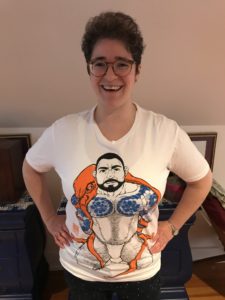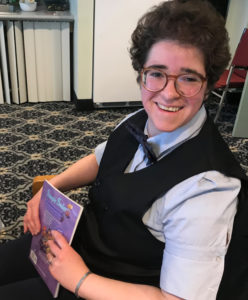Happy Lammas! This month’s harvest of links is loosely bound together by the theme of category reversal and overturned binaries (no surprise).
Over at Stay Woke Tarot, a blog that brings author Rashunda’s African-American heritage and political concerns to bear on topics in alternative spirituality, the post “Are you afraid of the dark?” challenges the color-prejudice in our conventional metaphors for good and bad. In this corner: enlightenment, “love and light”, angels in white robes. In the other: black magic, shadow side, a dark (hopeless) outlook. Rashunda’s poetic reversal of our typical language reminds me of my favorite lines from “The Phantom of the Opera” musical (LOL problematic fave): “Turn your face away from the garish light of day, turn your thoughts away from cold unfeeling light, and listen to the music of the night.”
Light for me doesn’t mean goodness. Or my true self. When I think of “light,” sometimes I think of the bright light of interrogation.
Someone flicking that bright overhead ceiling light on when you’re dozing off into a gentle sleep.
The searing hot sun in the desert, drying out and cracking the soil. Burning. Glaring. Parched land.
Dehydration.
The sun-bleached bones of a dead animal.
Interruption. You’re doing something “wrong” so let’s shine a light on it. Get it out into the open.
Judgement. A Renaissance-blonde angel clothed in sparkling white, ready to blow his trumpet and send us to Hell.
But “darkness” – for me – represents deep, rich fertile soil.
A womb.
Looking at a beautiful night sky.
A large, inviting void just waiting to accept creativity. Ideas.
My mom.
Having a pure black heart.
In the literary journal TriQuarterly, the personal essay “Both and Yet Neither” by novelist and essayist B. Pietras troubles a different boundary, recounting the struggles of his adolescence as a feminine boy, and his love-hate relationship with the myth of Hermaphroditus. Pietras shares how, even after he embraced his differences through cross-dressing and discovering androgyne role models in classic literature, his desires attached to conventionally macho, straight or straight-acting men. His uniqueness and his shame centered on his voice–a fraught problem for a writer, in particular, since “voice” is another word for the maturing writer’s distinctive style or viewpoint.
During my first week of college, I read a centuries-old love poem addressed to someone said to be a hermaphrodite. Published in 1688 by the poet and playwright Aphra Behn, “To the Fair Clarinda” praises a person who seems to be at once a “beauteous Woman” and a “Lovely Charming Youth.” Behn’s speaker relishes the ambiguity of her subject, claiming first that, although Clarinda’s female friends might be attracted to her, they can commit no “crime” with her—that is, they can’t actually sleep with her. But then the speaker pivots, slyly suggesting that if by chance such a crime is possible, Clarinda’s “form excuses it. / For who, that gathers fairest flowers believes /A snake lies hid beneath the fragrant leaves?” (Who indeed? Only after examining the footnotes did I understand the phallic connotations of the snake.) The poem closes by celebrating Clarinda as a “beauteous Wonder of a different kind,” and—for any readers who might still be confused—by alluding to Hermes and Aphrodite.
Behn’s three-hundred-year-old poem made me sit up very straight in my seat, my mind rinsed with wonder, awed at two of the messages it seemed to encode. The first had to do with history. Clarinda was proof that people who broke the rules around gender had existed for centuries: There was a we, and we had a past. The second had to do with desire. Clarinda was proof that androgyny didn’t have to be seen as an awful, freakish thing; to some, it was a marvelous quality. Seductive, even. For the first time, I considered the possibility that “hermaphrodite”—the word I hated, the slur that had hurt me so deeply—could be a caress.
As part of my journey into maleness, I’ve been trying to pitch my voice lower on the phone when I call strangers: my legislators, customer service, political phonebanking, and so forth. I don’t know if it’s fooling anyone, but it makes me feel more confident. I think twice about every habit of speech–does it sound feminine, and is that synonymous with pleasing, deferential, childlike? Can I dial that back, without sounding unnecessarily brusque or robotic?
Captain Awkward, the world’s greatest advice blog, gives the definitive list of reasons for not sharing that “Trump is crazy” meme, in “Rule Explainer: Why We Don’t Diagnose People Over the Internet”. Besides the often-cited problem of perpetuating mental health stigma, this point really stood out for me:
Even if internet stranger diagnosing could be accurate and didn’t cause stigma, it would still be a bad idea. As soon as we distract ourselves from the harm the victim is experiencing and transfer that attention to trying to figure out the psychology of the perpetrator …who we conveniently don’t have access to and can’t question …we start leaving the victim behind…
Why the fuck
did anyone decide
that the most important thing
a victim of bullying could do
is to understand
and take care of
the mental health
of the person who is harming them?
Why is it even a thing we think people should do? Like, at all?
Why are we trying to solve the life problems of the person who didn’t write in?
And why do we think that’s the work of our community, to the point that people know the rule about diagnosing and we still have to remind everyone (including myself!) not to do it?
I have a theory about why (you knew I had a theory):
We are addicted to redemption narratives.
We are especially addicted to stories where mean bad boys are reformed by the love and loyalty of a good lady who sees through their abuse to their true naked vulnerable heart and works really hard singlehandedly to keep the relationship going. Industries upon industries rise and fall on that one. But we like all kinds of redemption narratives and we like them a lot more than we like inconvenient ones where we have to think about victims, harm, or reparations.
One source of this addiction is “The Prodigal Son” story from the Christian Bible. Which, depending on where you live in the world, you don’t have to believe in or follow or even have ever read that book and its stories for it to have a profound influence on your culture and the stories it tells. It’s one of those sticky stories that sticks to things.
And right now we’re stuck with it.
The bare bones version: Rule-following brother was cool all along? That’s just what they should have been doing, no big deal. Rule-breaking jerk brother suddenly decides to be a little bit cool for five minutes? LET’S THROW A PARTY! Rule-following cool brother is like, hey, wait a second here, where’s my Not Being A Jerk party? Story: Yeah, you are great and everything, but let’s really appreciate this other person’s shiny new momentary coolness for a second. Cool brother: Ok, I guess. :continues following rules:
The story itself, as it’s intended to be read, is of course much more complicated and beautiful than that. The wayward son in the story has returned home of his own volition, he apologizes, he is not repeating the bad behaviors, he asks permission to return, and doesn’t think he’s entitled to anything special. The welcome he gets is a gift, freely given. The message is: Fairness is good, but kindness is much better, and we can afford to be kind. We love you and you’re still in this family even if you fuck up sometimes.
Beautiful, right?
So, is it petty to point out that his bad behavior in the story is “I was irresponsible with my inheritance” and not “I serially raped and harassed my coworkers for decades” or “I molested a bunch of the kids in my pastoral care” or “I beat the shit out of my wife behind closed doors” or “I swindled a whole bunch of people on the TV” or other crimes with actual living breathing victims?
Victims fuck up the parable, my friends. If Prodigal Son used to beat up the other brother every chance he got when they were growing up, does that brother still have to shut up and enjoy the party and rejoice and be glad his abuser is back in the fold? Are we still like “I know you never hurt anyone, but your brother temporarily, as far as we know, stopped hurting people, and he stopped squandering his money and that is really the most important thing! Stop moping and pass the hummus!”
I just want to give that son, the not-Prodigal one, a hug so bad. Especially since I keep meeting him again and again in the letters I get here, in families and social groups where someone is mean and the answer is “just ignore him” or “get over it, already.” “Forgive him.” “Invite him to the wedding.” “Keep the peace.” “We’re a faaaaaaamily.” “The Earth Needs That Water, Besides, He Has Depression.” “What if it’s just Asperger Syndrome?”
Somewhere in the game of telephone that became our cultural meta-narrative, this lovely little story was reforged into something where, if you are a certain kind of person and you abuse and bully other people, you don’t really have to apologize for abusive things you did, we as a community don’t have to have a reasonable expectation that you will stop doing those things, you can still be a repulsive entitled dangerous ass-boil of a person, but if (on the off chance you actually get caught) for one shining second you act like you might sort of try to do better, if you can make a case that you might not have completely meant it, if you can choke out some lip service that sounds even vaguely like “I’m sorry…”
We skip straight to the part where we throw you the goddamn party.
We start writing articles about how soon you can “rehabilitate your career.”
We talk about your addictions, your struggles, and we endlessly diagnose the reasons that might have made you behave like you did, literally anything that might not be “asshole made series of asshole free will asshole decisions, hurt others.”
And then we tell your victims that they can pretty much suck it.
While we’re on the subject of survivor-centered redemption and healing, check out the blog Fundamentally Free, which amplifies stories of folks who have left spiritually abusive and repressive Christian traditions. In the post “Violence and the Redemption of the Soul”, Jerry Proctor describes how he found an unlikely post-Christian spiritual path in martial arts, channeling his anger into tests of endurance.
I discovered competitive combat sports in my 30s. I’d been raised to avoid fighting. Be peaceful. Aggression was wrong. Blessed are the peacemakers. When my faith crumbled, I was left with a dearth of tools to build the person I would become; the man I wanted to be. I accidentally discovered boxing, and I loved it. The bug bit me on the first day. It shaped the man I became.
I didn’t approach the sport for any reasons I could articulate. I needed exercise. But week after week, as I went back, I knew I found something I needed. It fed something more. Only looking backward can I understand what drove me. There was so much unresolved anger. There was an absence of spiritual structure, and I needed a wordless way to rebuild my soul devoid of pomposity. That’s what you get from a lifetime of submerging rage, frustration, and disappointment inside. When your only tools are pious catch-phrases and Bible verses, the anger has no place to flow. It builds up. All those constraints were gone. Fortunately, I found my training…
As a student of theology who eventually walked away from it, I acquired an allergy for bullshit metaphysics. I love the physicality of the martial arts. It changed me without a lot of talking. My strength, my reflexes, my timing, my cardio. Training changed me without a lot of verbiage wrapped around why I wanted to change, or what I wanted to become.
Real Social Skills is a very smart blog about boundaries, power dynamics, resisting ableism, and thriving as a neurodivergent person. Their post “Don’t order people to feel safe” pinpoints a subtle kind of manipulation and doublespeak in social justice workshops, a problem that I’d sensed but never been able to articulate.
Social justice workshops often open by demanding that everyone consider the space safe and put absolute trust in the person leading it. For instance, workshop leaders will often say things like “This is a safe space. No one will feel unsafe here — but you might feel uncomfortable confronting your privilege. Understand the difference between being uncomfortable and being unsafe.”
“Everyone will be safe” is a promise we can’t keep. “Everyone must feel safe” is a demand that we have no right to make.
No workshop is actually safe for everyone. Sometimes, people are going to feel unsafe. Sometimes, people are going to *be* unsafe. People who feel unsafe need to be welcome in our workshops — and all the more so, we need to welcome those who are taking significant risks in order to learn from us.
When we tell people who are feeling unsafe that it must just be their privilege talking, we make the space much more dangerous for everyone in the room. Sometimes, people who feel unsafe are responding to real dangers. If we demand that participants who feel unsafe ignore the possibility that they are right, we are demanding the right to hurt them. That’s not something we should ever do…
…We have power as teachers and presenters, and it is possible to abuse that power. Even when the people we’re teaching are more privileged than we are in every relevant way, it matters how we treat them. Being privileged in society is not the same thing as being safe in a classroom. We are all capable of making mistakes that hurt people, and when we make those mistakes, it matters.
People have the right to manage their own safety. Our students have the right to decide for themselves whether or not they trust us, and how far they trust us. They have the right to revoke that trust at any time.
Riffing on J. Halberstam’s book title The Queer Art of Failure, columnist Laurie Penny at The Baffler teases out the implications of my favorite comfort TV in her post “The Queer Art of Failing Better”. Last year, Netflix rebooted the early-2000’s makeover show “Queer Eye”. The Fab Five’s interventions are not just for straight guys anymore; one of my favorite episodes was devoted to a black church mama and her shy gay son. But there are plenty of interventions for their original constituency: stalled-out straight dudes who need to be taught how to groom themselves instead of waiting for their wives and mothers to do it. It’s this burden-shifting of female emotional labor that Penny sees as the show’s real subject:
On the surface of things, it’s a straightforward quest for “acceptance,” supposedly of homosexuality, dramatized via the no-longer-so-outlandish vehicle of sending five gay men on an outreach mission to small-town Georgia with a vast interior design budget and a vanload of affirmations. What it turns out to be, though, is a forensic study of the rampaging crisis of American masculinity. In each new installment of the reboot, queerness is gently suggested as an antidote to the hot mess of toxic masculinity under late-stage capitalism. I am absolutely here for it, as long as we all get paid…
…What the Queer Eye guys seem to be gently teaching their subjects (and, by extension, their viewers) is that it is possible to live well without a woman to take care of you—and if you’re lucky enough to have one offer to do so anyway, maybe you should show her some consideration by picking up after yourself and learning how to apply the business end of a comb. When you put it like that, it sounds simple. But two thousand years of socialization and half a century of profit-oriented self-dealing throw up a few mental hurdles.
This show isn’t about how to win at life, but how to fail with style. It’s about giving straight guys permission to be more gracious losers. It helps that the show doesn’t actually have winners. This is not the ruthless, dick-smacking, alpha-primate pursuit of victory-for-victory’s sake that provides a plot line for most American reality television as well as for American politics, presuming you can still see clear water between the two. No, this is an oddly compassionate exit interview for the middle-managerial caste of straight dudes who are no longer steering a culture that prizes their skill set above everyone else’s…
…The crisis of capitalism is also, as theorist Nancy Fraser puts it, a “crisis of care”—of reproductive labor. The work that the world most urgently requires is work that women have traditionally done for low wages or for no wages, and this is work that cannot be effectively automated or subsumed within the profit model. Someone has to do the dishes.
This is not to say, of course, that the subjects of Queer Eye are first-order victims of global capitalism’s concerted campaign to hollow out working-class life. These men are not marginalized, but they are nonetheless living in the margins of the lives they had perhaps expected. There are people with far more pressing problems than simply having no idea that clothes don’t live on the floor. In their own way, though, these men are quietly drowning, and a lot of the people who love this show the hardest have spent years of our offscreen lives trying to serve as—or at least to inflate—the life-rafts.
Actual queers in today’s America, on the other hand, often have more serious problems than learning to use a laundry hamper. For trans and gender-nonconforming people, along with right-wing efforts to roll back civil rights at the state and federal levels, we have to deal with left-wing “contrarian” thinkpieces disputing our identities. Trans writers and well-informed allies (including the Human Rights Campaign, a leading LGBTQ activist organization) roundly condemned Jesse Singal’s Atlantic Monthly cover story on desistance and the supposed pressure on trans kids to make irrevocable medical decisions. Now, journalist Noah Berlatsky has compiled a list of links debunking the biases and inaccuracies in this prominent feature story. See, for instance, Alex Barasch’s response piece at Slate, asking why we continue to privilege cis parents’ anxiety over life-saving care for the majority of trans youth who don’t freely choose to revert to their birth-assigned gender:
[O]nly a specific subset of detransitioners—namely cisgender women and girls who misinterpreted mental health issues or more general gender nonconformity as signs that they might be trans, only to realize later that this was not the case—are of interest to Singal and the media writ large. Those who are intimidated back into the closet, those who are battling intense stigma both internally and institutionally, those who begin the process only to find that their insurance won’t cover their transition—none of these people are given a voice. I know more than one trans man who might have been counted among Singal’s tomboys who were saved from themselves if profiled in their mid-teens—never mind that they were repressed, miserable, and would in fact go on to transition. But such is the double standard of the piece. A fourteen-year-old who outgrows her dysphoria is celebrated, her self-knowledge taken as definitive; a fourteen-year-old who seeks to transition is still in flux and must be given time to change their mind.
Finally, to end on an upbeat (?) note, for fans of this blog’s Murder Ballad Mondays. At CrimeReads, an affiliate of Literary Hub, detective novelist Mark Billingham explores “Why the Best Country Music Is Crime Fiction”: “At its best, country music…seems to me to do what the very best mystery fiction can, and arguably should do. It can tell dark, dark stories, and wrap them up in an entertaining package, turning an often twisted narrative into an earworm. It can reveal unpleasant truths while it keeps your foot tapping.”




